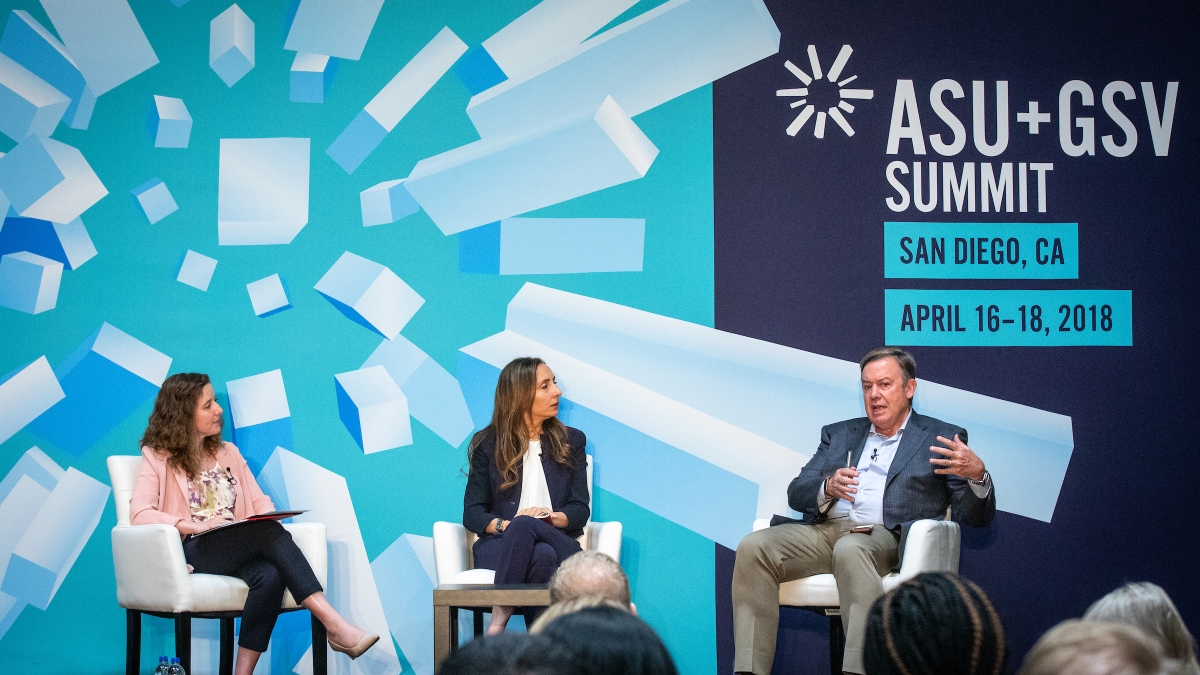Conflict, access major obstacles to improving education in Arab nations

Editor's note: Read more of the highlights from the ASU + GSV Summit on our blog.
The Arab world has one of the world’s youngest populations and is in great need of access to higher education to accelerate its economy — a challenge that Arizona State University is helping to solve.
Maysa Jalbout, founding CEO of the Abdulla Al Ghurair Foundation for Education, spoke at the ASU + GSV Summit in San Diego on Tuesday about improving education in Arab countries through a partnership with ASU. The Al Ghurair Foundation is a Dubai-based organization that provides underserved, high-achieving Arab students with scholarships, support and skills training.
“The challenges in the Arab world are not unlike challenges in global communities around higher education, but they happen to be more acute,” she said.
“The first is around access. If you come from a privileged background, you’re three times more likely to get access to higher education. The second is quality.
“The third, and the one closest to my heart, is conflict. You have these huge disruptive factors which are robbing young people of the opportunity to continue their education.”
ASU President Michael Crow said that traditional universities are not suited to quickly moving to help on a global scale because of their old-fashioned culture and design.
“Academia as a culture is too much built around the notion that we educate the worthy and the smart and the gifted. We build exclusion as a measure of excellence, as opposed to impact,” he said.
“And (traditional universities) are designed like religious organizations rather than complex, socially engaged, transformative institutions. They’re slow to change, argumentative and not interested in broader social issues.”
That outdated model prevents universities from responding to the refugee crisis, Crow said.
“It requires an immediate response. They can’t do that. It requires deploying resources. They can’t do that. It requires a culturally adaptive response. They can’t do that,” he said.
But by empowering faculty and changing the model, ASU is able to extend its reach around the globe.
“We can say we’d like to engage with the refugee community in Jordan with education content at scale. Or we’re working with friends in the Middle East who are finding new ways to expand STEM education,” he said.
“We’re able to do that in real time because of the change in culture as well as our deep commitment to technology.”
The Abdulla Al Ghurair Foundation for Education has partnered with ASU on three initiatives to provide education to Arab youths in 22 countries: Open Learning Scholars, a four-year scholarship program for students to acquire master’s degrees from ASU Online; the Young Thinkers program, an ASU-built online college- and career-preparation platform for high school students in the United Arab Emirates; and STEM Scholars, an opportunity for students to study for their master’s degree at ASU while also receiving mentorship and other support.
Jalbout said that high rates of unemployment are driving an urgency to innovate in education.
“We’re the youngest region in the world and we have the highest youth unemployment rate, close to 30 percent, and our enrollment rates in higher education are lower than the global average, at 28 percent and the global average is 35 percent,” she said.
Half of the world’s refugee population resides in the Arab world, Jalbout said.
“Among young people, 80 percent of those not in school come from conflict countries,” she said. “It transcends borders. Syrians are everywhere in the region.”
Yet there are many opportunities too, Jalbout said.
“We think the solutions are close at hand and achievable. We’re looking to create partnerships like the one with ASU to solve some of those problems.”
Top photo: Maysa Jalbout (center), founding CEO of Abdulla Al Ghurair Foundation for Education, and moderator Jacqueline Smith, an assistant vice president and executive director of the Office of University Initiatives listen to ASU President Michael Crow during a panel discussion on "Responding to Educational Needs in the Arab World" at the ASU + GSV Summit on Tuesday. Photo by Charlie Leight/ASU Now
More Arts, humanities and education

ASU professor's project helps students learn complex topics
One of Arizona State University’s top professors is using her signature research project to improve how college students learn science, technology, engineering, math and medicine.Micki Chi, who is a…

Award-winning playwright shares her scriptwriting process with ASU students
Actions speak louder than words. That’s why award-winning playwright Y York is workshopping her latest play, "Becoming Awesome," with actors at Arizona State University this week. “I want…

Exceeding great expectations in downtown Mesa
Anyone visiting downtown Mesa over the past couple of years has a lot to rave about: The bevy of restaurants, unique local shops, entertainment venues and inviting spaces that beg for attention from…

